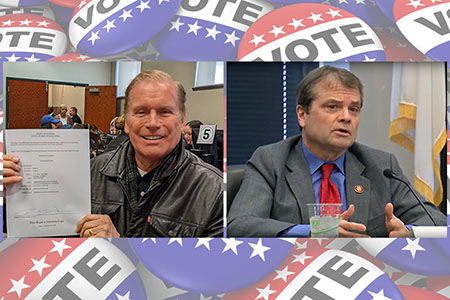Dec. 29, 2011 – Former Illinois legislator and Chicago condo attorney Ellis Levin has created a website to help him campaign for Circuit Court judge. Levin is one of seven candidates running in the county’s 8th sub-circuit that includes downtown Chicago. The next primary election is scheduled for March 20, 2012. The web domain “ellislevinlaw.org” was registered on November 12, 2011. Levin filed for candidacy on December 5 at 4:44 p.m., just 16 minutes before the deadline. The domain is registered to “Ellis Levin Law,” listing Levin’s office address in the Lakewood Balmoral district of Edgewater, a community north of downtown Chicago.
“My pioneering commitment to advocating and promoting equal rights successfully delivered nearly 300 laws focused on human and consumer rights,” declares Levin on the website. “These laws were considered by many to be ‘AHEAD OF THEIR TIME’ and are the same laws which now provide the legal foundation for the fair treatment of all.” Although some text is repeated, Levin needs 3,500 words to summarize his career. He includes details such as a “certificate of appreciation award” received twice from the Chicago Area Scouting Council. However, other awards include “Best Legislator,” “Outstanding Legislator,” and “Legislator of the Year,” although the organizations that presented the awards could not be reached over the holidays for confirmation. Not included is a designation by Chicago Magazine in 1990 as one of the ten worst legislators. Levin claims to be recognized by the Supreme Court of Illinois and state appellate courts as “an expert in the area of condominium law,” and that his writings and interpretations have been referenced in one Supreme Court decision and 18 Appellate Court decisions. While a searchable database of Supreme Court decisions only goes back to 1997, the Illinois Condominium Property Act is referenced numerous times in a 2002 case between a condominium association in Willowbrook and a unit owner. Appellate Court of Illinois decisions since August 1970 are accessible online and “condominium property act” is referenced in 29 cases going back to 1997. However, a search for “Ellis Levin” produces only one case in which Levin himself is mentioned, a 2002 case in which Levin represented two defendants who were sued in 1993 for unpaid rent by LaSalle National Trust. After years of hearings and transfers, the trial court dismissed the claim. LaSalle appealed but lost. Levin also claims to have “successfully filed multi-million dollar class action lawsuits in both federal and state court,” listing two cases from the 1970s and one from 1980. In a U.S. District Court case in 1980, Gary B. v. Cronin, Levin – representing emotionally disturbed children who alleged they had to attend private schools because Illinois public schools did not have special education facilities for them – is mentioned in the decision but only because of his fees. While supporting the plaintiffs, the court objected to the fees that the law firm of Schwartzberg, Barnett & Cohen were seeking for three attorneys, including a “Mr. Levin,” who billed 244 hours at $85 per hour (the equivalent of $233 in 2011). The court reduced the firm’s claim of $27,201 to $20,000, leaving it to the firm how the money was divided. “It is the sense of this court,” reads the decision, “that the attorneys for plaintiffs may not have expended their hours as efficiently as possible and that the requests should be reduced.” Levin ‘brilliant,’ liberal, but a bad politician, says condo law co-author Dr. Donnie Rudd, who has degrees in chemical engineering, law, bioscience and bioengineering – and co-authored the 1983 amendments to the Illinois Condominium Property Act – says Levin is a good attorney but a bad politician.
According to Rudd, Levin’s weakness in private practice is that “he cannot control his clients because he does not have a commanding presence even though his legal ability is very good.” Levin, who Rudd described as a “very liberal” Democrat, worked for Rudd’s law firm in Schaumburg from around 1988 to 1991. Contacted on Thursday, Rudd added, “I think Levin has the intellect, education, and ability to be a good judge.” [On September 23, 1994, Rudd requested that his name be removed from a list of attorneys licensed to practice law in Illinois. He did not respond to a four-count complaint of misconduct against him filed with the Attorney Registration and Disciplinary Commission.] As condo attorney, no stranger to controversy In 2007, according to the Chicago Tribune, Levin, on behalf of Thorndale Beach North Condominium Association, wrote to an 85-year-old resident with ovarian cancer and severe arthritis, and told the woman she would be fined $75 – plus $150 in legal fees – because she had a custodian retrieve from a package room after hours a shipment of chemotherapy pills. The woman, Blossom Fefer, requested a hearing to appeal the fine but wanted a friend to represent her because she was too weak from the cancer and chemotherapy. Levin wrote back, saying only she or a licensed attorney could attend the hearing. He also asked for detailed proof she was telling the truth about the shipment. The dispute ended well. In his December 26, 2007, What’s Your Problem? column, Jon Yates reported the president of the condo board eventually decided not to fine Fefer. Meanwhile, Levin was legal counsel for Marina Towers Condominium Association when it famously claimed in 2007 that “because of the architectural significance of our building, the condominium association holds a common law copyright on the use of the association name and building image.” The claim, widely disputed by lawyers and other experts on intellectual property, was eventually loosened and then dropped. Marina City Online has for years attempted to document all uses of Marina City’s name and image, commercial or otherwise, and has never encountered anyone receiving or even seeking permission from the condo board. 2007 was the year in which legal expenses incurred by MTCA were 149 percent over budget, according to an audit by an outside CPA firm. With Levin as its general counsel, but not the only attorney hired that year by the condo association, general legal fees – not including collections – totaled more than $37,000.
|















